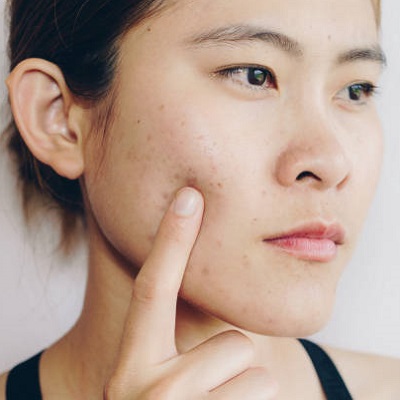
Acne scars can remind us of our battles with troublesome pimples during adolescence or even adulthood. These scars not only affect our physical appearance but can also profoundly impact our self-confidence and self-esteem. One of the most common questions individuals ask with acne scars is, “How long will it take for these scars to fade?”
While there’s no one-size-fits-all answer to this question, let’s explore the factors that influence the duration of acne scar fading and some potential treatments to speed up the process.
What are Acne Scars?
Acne scars result from inflammation caused by the body’s response to acne breakouts. When pimples occur, they often damage the skin’s underlying tissue, causing the body to produce collagen to repair the damage. Depending on various factors, this collagen production can lead to either raised or depressed scars.
Types of Acne Scars:
- Ice Pick Scars.
- Boxcar Scars.
- Rolling Scars.
- Hypertrophic Scars.
Factors Affecting Acne Scar Fading Duration:
Scar Type: The type of acne scar you have can significantly impact the fading duration. Ice pick scars are generally more challenging to treat and may take longer to fade than shallow boxcars or rolling scars.
Severity of Scarring: The severity of your acne scarring can also determine how long it takes for the scars to fade. Deeper and more extensive scars require more time and intensive treatments.
Skin Type: Different skin types respond differently to treatments. Individuals with fairer skin tones may experience faster fading than those with darker skin due to differences in melanin production.
Age: Younger individuals tend to have more robust collagen production, which can work in their favour for scar fading. However, older individuals might experience a slower rate of scar improvement due to decreased collagen production with age.
Lifestyle and Habits: Certain lifestyle factors, such as smoking, poor diet, and inadequate skincare, can hinder the skin’s natural healing process, delaying scar fading.
Sun Exposure: Sun exposure can worsen the appearance of acne scars and slow down the healing process. UV radiation can darken scar tissues, making them more noticeable.
Typical Duration for Acne Scars to Fade:
The duration for acne scars to fade varies widely and can range from a few months to several years. It’s important to note that eliminating scars is not always achievable, but their appearance can be significantly improved. Here’s a general timeline for the fading process:
Early Stages (0-3 months): During the first few months after acne heals, the scar may appear red or pink and feel raised to the touch. It is the initial phase of scar maturation, and scars may continue to change in appearance during this time.
Maturation Phase (3-12 months): As the scar matures, the redness usually starts to fade, and the scar may become less raised. During this phase, the skin’s natural healing process and collagen remodelling are crucial.
Continued Improvement (12-18 months): After the first year, further improvement in scar appearance may occur, although it may be less dramatic compared to the initial months.
Long-term Fading (18+ months): In some cases, the fading process can continue for several years, especially for more severe or deep scars. Continuous collagen remodelling and skin cell turnover contribute to the gradual fading of scars.
Treatment Options to Expedite Acne Scar Fading:
While the natural healing process plays a significant role in scar fading, several treatments can expedite the process and improve the overall appearance of acne scars:
Chemical Peels: Chemical peels involve the application of a chemical solution to the skin, which causes the top layers to peel off, promoting skin regeneration and reducing the appearance of scars.
Microneedling: Microneedling involves using fine needles to create controlled micro-injuries in the skin, stimulating collagen production and helping to improve the appearance of scars.
Laser Therapy: Various laser treatments, such as fractional laser or intense pulsed light (IPL), can target scar tissues, promoting collagen remodelling and improving the appearance of scars.
Dermal Fillers: For certain types of depressed scars, dermal fillers can be injected to raise the scar and make it more level with the surrounding skin.
The Bottom Line!
Several factors, including scar type, severity, skin type, age, lifestyle, and sun exposure, influence the duration for acne scars to fade. While the process can take months to years, many individuals experience visible improvements in scar appearance over time.
Moreover, with various treatment options available, individuals can actively accelerate the fading process and regain their confidence. Remember that each person’s skin is unique, so it’s essential to consult with a dermatologist at SKN Cosmetic Clinic Islamabad to develop a personalized treatment plan for your acne scars.
Patience and consistent care are key to achieving the best possible outcome in the journey towards scar fading and smoother, clearer skin.






